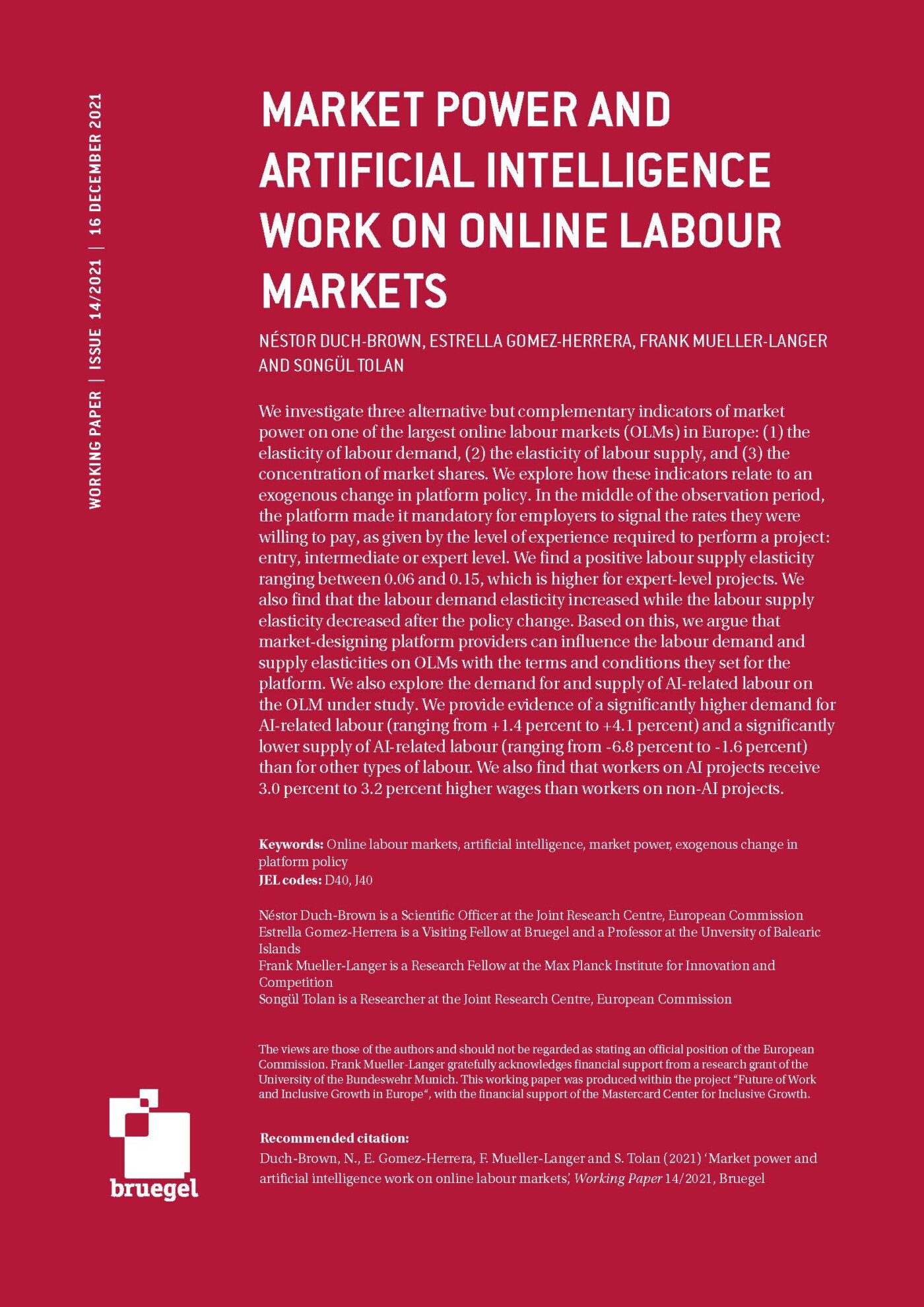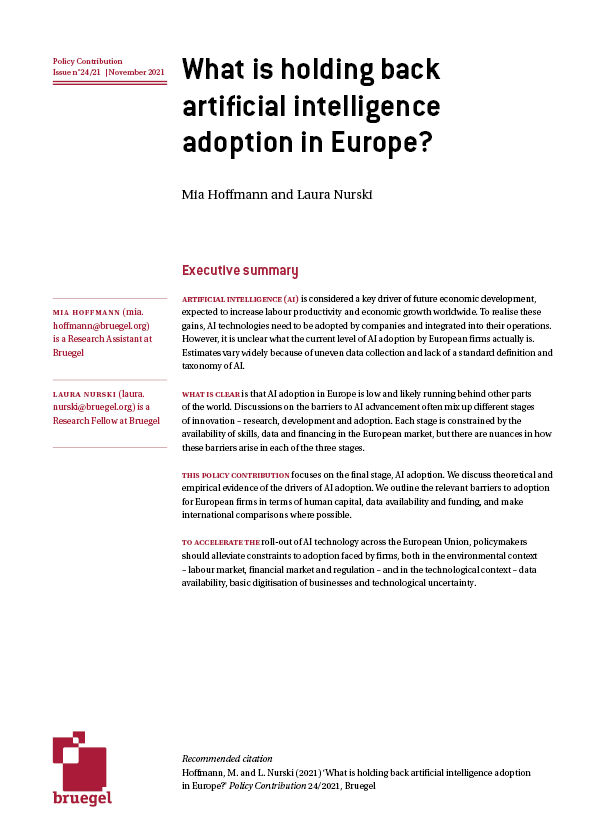Blog Post
Europe has an artificial-intelligence skills shortage
How severe is Europe’s dearth of AI talent and how does it compare to the United States, China and the United Kingdom – the world’s AI champions?
However intelligent artificial intelligence might be, it still relies on qualified humans, of which there is a notable lack in the European Union. In 2019, German firms spent an average of six months hunting to fill each tech position.
The lack of AI skills undermines Europe’s industrial prospects. Without the right training to close the skills gap, fewer businesses in Europe are able to integrate AI into their business operations, foregoing possibly significant productivity gains. A scarcity of talent in Europe also shows that salaries and broader job attractiveness in the European Union cannot compete in the global labour market. Promising European start-ups are unable to attract the talent they need. As long as AI expertise remains a luxury only tech giants and hedge funds can afford, the EU will fall short of its technological and growth goals.
Europe is home to some of the world’s best science and engineering research institutions and indeed produces more doctorates in these fields than any other part of the world[1]. But, as Kai-Fu Lee points out in his book AI Superpowers, the adoption of AI technology relies less on top-notch scientists than it does on skilled data scientists, programmers and AI business translators, who can put existing deep-learning algorithms to practical commercial use.
So how severe is Europe’s dearth of AI talent and how does it compare to the United States, China and the United Kingdom – the world’s AI champions? We find that the EU has a poor track record of training and retaining AI talent. Some new initiatives are attempting to improve the situation, but their results are not yet visible in the data.
AI-relevant degrees awarded each year
Data on computer science degree awards provides some indication of educational attainment in AI-relevant degrees[2]. Computer Science is a broad field that includes data science, information technology, software engineering, robotics and other AI specialisations[3]. Unfortunately, data is not available at the more granular level[4].
Figure 1 shows computer science bachelor degree awards in the EU, US and UK, but not China, because of lack of data. Figure 2 shows postgraduate degree awards (masters’ and PhD combined) in all regions. To give a sense of the EU’s relative firepower, Figure 3 shows the absolute numbers of postgraduate degrees awarded each year (note however that the EU figures are an underestimate, since data is not available for several EU countries, including France).
The EU fares poorly by all three measures: the number of awarded bachelor’s degrees actually decreased in the eight-year period ending 2018. While there has been some progress on the postgraduate front, the EU’s 6% annual growth rate pales in comparison to the US’s 13%. In other words, the gap has widened.
Capacity to attract and retain AI PhD talent
The EU’s AI education deficit could be mitigated through in-bound migration. However, and as Figure 4 illustrates, the EU labour market attracts a relatively small share of international AI talent. Worse still, Europe loses a large share of the PhDs it trains (to the US especially).
Figure 4 is based on an analysis by jfgagne.ai of the profiles of PhD-holding contributors to top AI conferences[5].
The distribution of AI talent in the active population
Another piece of evidence comes from a study of LinkedIn profiles in which AI skills were identified through a combination of keyword filtering and machine-learning screening of more than 645 million profiles. The study found that the UK has 1.8 times more individuals with AI skills than the EU average[6]. The US has 3.1 times more.
Number of universities in top rankings for AI
Finally, we look at the number of top AI universities in each region, ranked on the basis of publication output. Figure 5 shows clearly that US universities dominate the ranking. EU universities consistently underperform.
The numbers presented here paint an unflattering picture. Some efforts are underway at the national and EU levels to make up the AI deficit. In August 2019, the German government said it would award 30 new professorships in AI. In February 2020, the European Commission committed to devising a plan that would “attract the best professors and scientists” and “offer world-leading Master’s programmes in AI”. These are small, initial steps.
The inadequacy of the EU’s response extends to its budgetary commitments. The EU budget, as agreed by the European Council on 21 July 2020, dedicates less than €500 million to strengthening the EU’s digital skills (a 17% reduction compared to the European Commission’s proposal)[7]. Spread over seven years and 27 countries, €500 million is not ambitious enough – consider that it can cost up to €5 million to finance an internationally competitive AI professorship.
Of the 30 new professorships promised by the German government, only two have been awarded so far. This is a prestigious and well-funded initiative and its slow take up illustrates the difficulty in building AI educational capacity in the EU. The EU needs substantial investment if it is to achieve its technological and growth goals.
[1] OECD, Education and Training Indicators, 2019.
[2] Following the definition provided in an EU report on AI education in Europe. We also explored completion of AI-relevant courses. However data was only available for the US.
[3] See the full list of programmes for the EU here; for the US here; and for China here.
[4] China: The Chinese authorities do not report statistics on education at a granular programme-level – reporting is done at a high general subject level (eg ‘Science’ or ‘Enginering’). We must thus rely on non-official estimates. We found a point estimate for the number of computer science graduates at the postgraduate level for the academic year 2014/2015. It is from an academic paper in which the authors conducted their own survey of major research universities in China. EU: There is no aggregated reporting at EU level. We must thus rely on non-official aggregations. Informatics Europe, an association of computer science departments and research laboratories in Europe, conducts an aggregation exercise yearly for computer science degrees. US: The US department of education reports the number of computer science degrees awarded each year.
[5] Implying a selection bias in favour of PhD holders who have the time, connections and financing to attend such conferences.
[6] On data limitations, LinkedIn states that “LinkedIn’s membership covers around 50% of Europe’s active labour force, its members are not evenly distributed across the EU. While the results are therefore not statistically representative, the digital and tech workforce tends to be well represented within our members”.
[7] In the European Commission’s May 2020 budget proposal for the Digital Europe programme, €600 million of the total programme budget of €8.2 billion was allocated to Digital Skills & Jobs, ie 7% of the total. We applied this ratio to the Europe Council’s July 2020 revised budget for the Digital Europe programme (€6.8 billion).
Republishing and referencing
Bruegel considers itself a public good and takes no institutional standpoint. Anyone is free to republish and/or quote this post without prior consent. Please provide a full reference, clearly stating Bruegel and the relevant author as the source, and include a prominent hyperlink to the original post.










